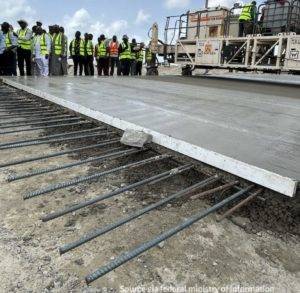The Minister of Works, His Excellency Senator Engr. David Umahi, expressed profound satisfaction with the ongoing construction work on the Lagos-Calabar Coastal Highway. Emphasizing the quality and pace of the project, Senator Umahi reiterated the commitment of the Tinubu administration to fulfilling its Renewed Hope Agenda. He called upon Nigerians to maintain their faith in the administration, echoing the trust expressed at the ballot box last May.
Describing the Lagos-Calabar Coastal Highway as a cornerstone of national economic development, Senator Umahi highlighted its significance within the works sector. He disclosed ongoing efforts by the Federal Government to collaborate with host states along the highway, ensuring the provision of land for the establishment of economically viable towns. This initiative aims to maximize the economic benefits for communities adjacent to the highway.
Engineer Umahi elaborated on the technical aspects of the construction process, detailing progress in dredging, excavation, dewatering, sand filling, and the placement of the crushed stone base. He emphasized the importance of drainage works, culverts, and cement stabilization in ensuring the durability of the infrastructure. The Minister projected the completion of the first phase within 36 months, underscoring the government’s commitment to timely delivery. Furthermore, he announced plans for a train station at the Ikorodu junction, facilitating connectivity with the Ikorodu-Sokoto Highway.
National Assembly Pledges Support for Timely Completion
During an inspection tour of the project site Lagos-Calabar Coastal Highway, Senator Barinada Mpigi, Chairman of the Senate Committee on Works, and Rt. Hon. Akin Alabi, Chairman of the House Committee on Works, affirmed the unwavering support of the National Assembly. They assured the Minister of their commitment to providing necessary funding through appropriation, ensuring the expeditious completion of this vital infrastructure project.
Federal Controller of Works for Lagos State, Engr. Mrs. O. I. Kesha, reiterated the dedication of her team to oversee the project’s execution diligently. She pledged round-the-clock supervision to ensure compliance with specifications and adherence to the project timeline. The collaborative efforts between the executive and legislative branches, coupled with vigilant oversight from relevant stakeholders, reflect a unified commitment to advancing national development through critical infrastructure projects like the Lagos-Calabar Coastal Highway.
Lagos-Calabar Coastal Highway Project Set to Revolutionize Movement and Economic Landscape
At a recent press briefing, Minister of Works, Senator David Umahi, unveiled plans for a transformative Lagos-Calabar coastal highway project aimed at enhancing connectivity and economic integration between the northern and southern regions of Nigeria. The ambitious project, championed by President Bola Tinubu, aims to construct a 700km highway spanning nine coastal states, starting from Ahmadu Bello Way, Victoria Island in Lagos. The road is poised to serve as a vital artery, facilitating the seamless movement of people, goods, and services between regions.
The Lagos-Calabar coastal highway, equipped with two spurs connecting to Northern Nigeria, promises to revolutionize travel dynamics and economic prospects along its route. With the first phase encompassing a 47.47km stretch from Victoria Island, boasting five lanes on each side and a central train track, the project holds immense potential for economic growth and development. Economic analysts predict a substantial boost to Lagos State’s economy, estimated at 50%, upon completion of the initial phase. This surge is attributed to enhanced access to the bustling Lekki Deep Seaport and the vibrant economic corridor housing the Dangote Refinery and Petrochemical Complex, among other multinational industries.
Reducing Distance, Amplifying Opportunities: The Impact of Lagos-Calabar Coastal Road
An intriguing aspect of the Lagos-Calabar coastal highway project lies in its ability to compress distances and unlock new opportunities for regional connectivity and economic prosperity. Notably, the road’s strategic alignment is poised to significantly shorten travel distances, particularly between Lagos and Ondo states. For instance, the journey from Ibeju-Lekki in Lagos to Araromi in Ondo state, spanning approximately 50 kilometers along the coast, is projected to take just an hour. This dramatic reduction in travel time holds immense promise for enhancing trade, commerce, and social interactions across regions.
Furthermore, stakeholders are optimistic about the profound impact of the Lagos-Calabar coastal highway on Cross River State’s economy and tourism sector. Commissioner of Information, Erasmus Ekpang, lauded President Tinubu for his visionary leadership in translating the long-awaited project into reality. Ekpang emphasized the highway’s potential to serve as a catalyst for economic transformation, particularly in agriculture, by bolstering the value chain and increasing the profitability of local farmers.
Additionally, the road is expected to attract a surge in tourism traffic, showcasing the state’s unique attractions and bolstering its tourism economy. Alphonsus Eba, Chairman of the All Progressives Congress in Cross River, commended President Tinubu for delivering on his promises, underscoring the project’s significance in driving socio-economic development and prosperity in the region.
Table of Contents
Discover more from OGM News NG
Subscribe to get the latest posts sent to your email.














